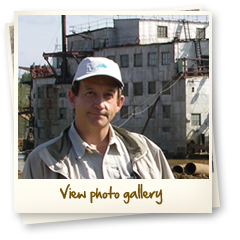

My name is Bill LeBarge. I was born and raised in the Yukon and I am a beneficiary of the Ta'an Kwatch'an First Nation - the people of Lake Laberge. I am the Placer Geologist for the Yukon Geological Survey, and have studied Yukon placer gold deposits and the Yukon's placer mining industry since 1993.
I completed my B.Sc. in Geology at the University of Alberta in 1985, and I finished my M.Sc. in Geology (Sedimentology) at the University of Calgary in 1993.
One of the main activities that I enjoy as part of my job is consultation with the Yukon's placer miners. During the mining season I visit as many mining operations as possible to document and discuss the geology, gold characteristics and future development of their mines. It's very cool to see the gold nuggets and gold dust that the miners have recovered each season.
I am also currently leading a project which is studying the gold characteristics and placer potential of the Indian River near Dawson City. In this project I am working with Dr. Vladimir Naumov of Perm State University (Russia), who has come to the Yukon for the last two summers along with several of his Master's students.
Another exciting part of my job is that I sometimes travel internationally to present new findings at geologic conferences. I have also done some field work in Russia, visiting many historic and actively-mined gold, platinum, diamond and titanium placer deposits throughout the former Soviet Union.
 Q: What is the title of your job and what do you do?
Q: What is the title of your job and what do you do?A: Placer Geologist. I study the geology of placer deposits, the type of mineral deposits that are found in gravel and sand. In the Yukon, it's mainly placer gold.
A: I work for the Yukon Geological Survey, based in Whitehorse, Yukon.
A: In the summer while doing fieldwork I often work 10 to 12 hours a day, 7 days a week, while in the winter I work usually from 8:30 to 5:00 and 5 days/week.
A: I work in the field in the summer months, throughout the Yukon. In the winter I am based in Whitehorse in the office and laboratory.

A: In the field I use gold pans, sluice boxes, shovels and rock hammers. In the office I use a computer (GIS and Office programs) and in the lab I use scales and microscopes.
A: My job requires a Master's degree in Geology. In our organization we also have mandatory training in many things such as firearms and bear safety, first aid and helicopter safety.
A: This profession is for those adventurous types who have a keen attention to detail and the ability to understand and interpret a wide range of information.
 Q: What do you like best about your job?
Q: What do you like best about your job? A: I like the wide variety of people I get to meet - placer miners, university researchers, government workers, Russian colleagues, First Nations prospectors. I like being able to offer advice as well as learning things from all of them.
A: Working outdoors doing field work is usually very nice in the summer, and there are opportunities to travel to international conferences and meet interesting colleagues.
A: With an advanced degree and initiative there are significant opportunities for advancement in this career.
A: The field work can be quite demanding - digging and carrying heavy samples and long drives from site to site. Winter office times can demand long hours in front of a computer.

A: I chose it because I always had an interest in rocks, minerals and mining, and I wanted a job where I could work outside in the summer.
A: There are many memorable events, but the most rewarding are when I hear about new areas being explored based on ideas generated from my research.
A: Although most of us geologists get the same basic education, the neat thing about geology is that there are a huge variety of different specialties - examples include petroleum geology, mineral deposits, bedrock and surficial mapping, and of course placer geology. Once you figure out which specialization you like the most, it's very rewarding to pursue that profession with an advanced degree or some other further studies.